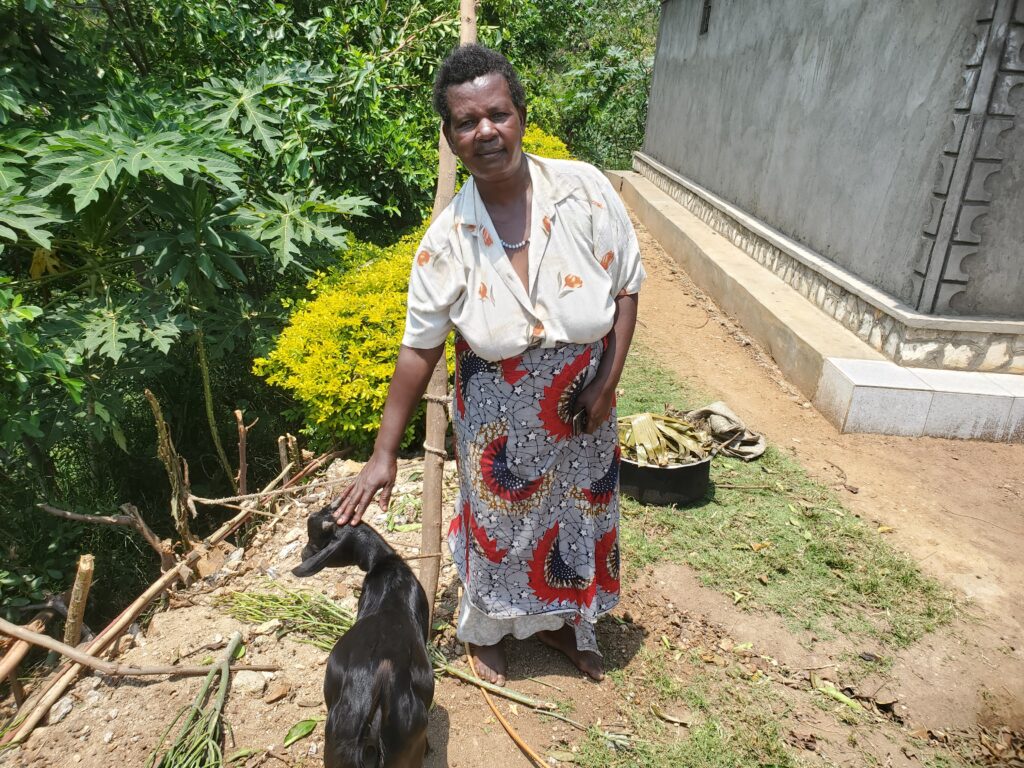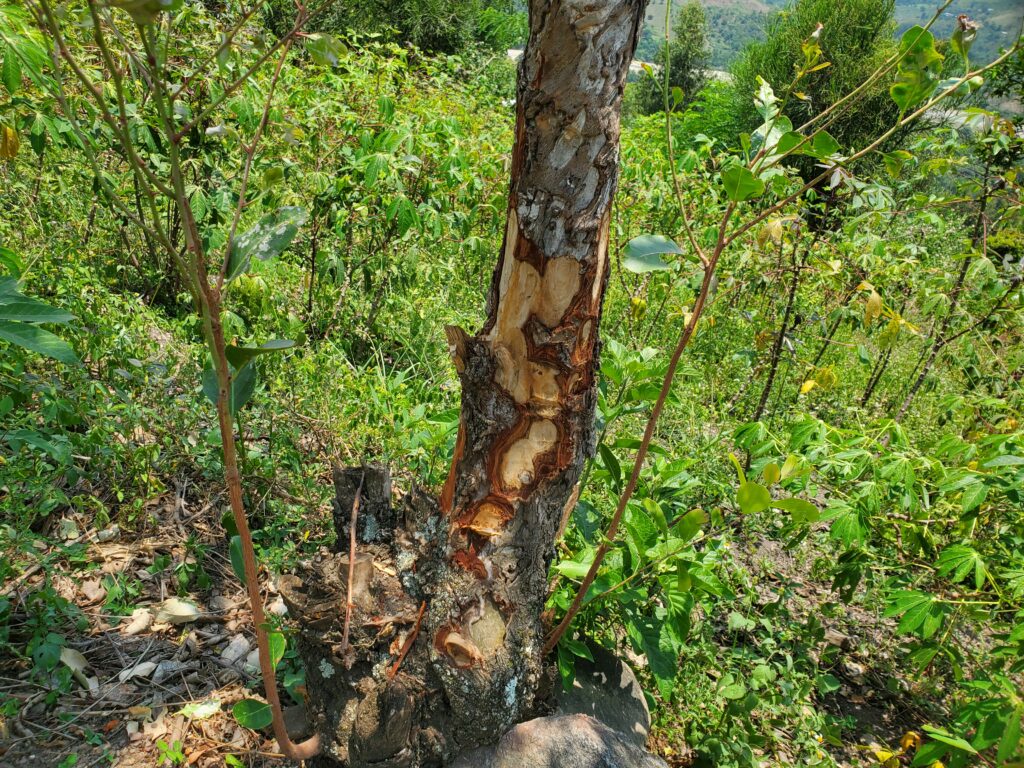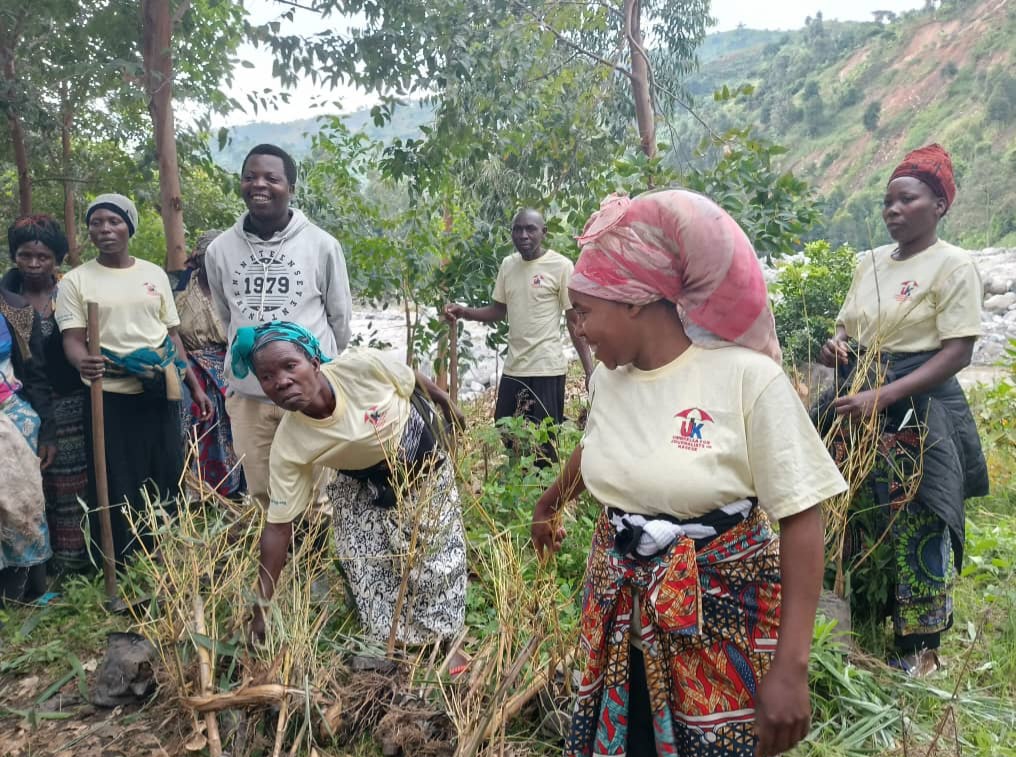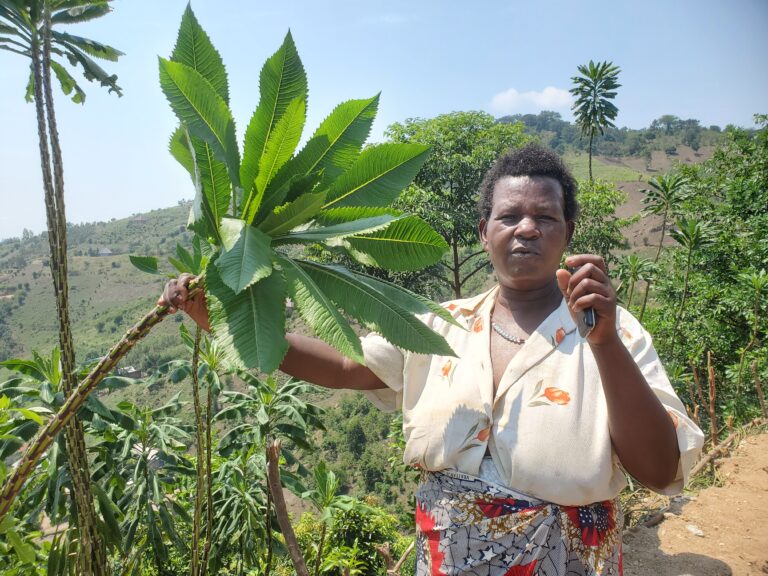BY INNOCENT KIIZA
Biira Ndobya, a 45-year-old mother of 12, leads a group of seven women in Base Camp village, Bulembia Division, Kasese Municipality. As a respected figure in her community, Biira is among the many women harnessing indigenous knowledge to combat climate change and treat diseases using local herbal remedies.
Ndobya’s journey began with the teachings of her mother, a traditional healer who treated people using medicinal trees from their ancestral land.
“I remember watching people come to our home, desperate for help, and seeing them return with gifts of food and chickens to thank my mother for curing them,” Ndobya recalls.
Inspired by her mother’s wisdom, she requested to be trained. “She would take me to the garden and show me different trees, explaining which ones cured coughs, which leaves to mix with certain roots for other ailments. That’s how I started learning.”
Over time, Ndobya became an expert in identifying medicinal trees like Albizia coriaria (Omusisyo), Spathodea campanulata (Embina), Tetradenia riparia (Omutubya), and Kigelia Africana (Omumbiri). These trees have been used to treat ailments such as malaria, cough, flu, headaches, ulcers, and diarrhea.
She shares this knowledge with other women in her community, empowering them to contribute to climate resilience and health through the use of indigenous trees.
“I have taught women to plant trees that serve both medicinal and environmental purposes,” Ndobya explains.
By encouraging the planting of herbal trees for medication, as well as trees for firewood and shelter, Biira is helping women reduce their dependence on costly medical treatments and contribute to climate action.
Her teachings have not only empowered these women but have also led to healthier communities.

Oliver Musoki, 32 years old and a mother of three, is one of the students trained by Ndobya.
She expressed her gratitude for the training, revealing how it has significantly reduced her spending on medications for common ailments like flu, cough, and malaria.
Oliver shared that the knowledge she gained from Ndobya has been life-changing.
For instance, when her children fall ill with malaria, she prepares a mixture using Kigelia africana (omumbiri). For flu and cough, she combines Gillet (Omulhungulh) and Albizia coriaria (omusisyo), and within a week, her children show noticeable improvement.
Oliver credits these traditional remedies for keeping her family healthy and minimizing medical expenses.
Similarly, Mrs. Juliet Kambale, a 34-year-old mother of five, praised her training under Ndobya.
She explained that the skills she learned have been invaluable, especially in treating women with fertility challenges and recurrent miscarriages.
Juliet has even turned her knowledge into a source of income, treating patients in her community and receiving payments for her services.
However, she continues to consult Ndobya for guidance on proper mixing and measurements when needed, and in more complex cases, she refers patients back to Ndobya or purchases remedies from her for clients.
Another member, Jovia Mbalhamia, highlighted the community’s broader efforts to integrate medicinal and spiritual tree planting as part of their environmental and health initiatives.
She mentioned that they have planted various tree species on two acres of land, including Draceana (Omuramura) for preventing landslides, Podocarpus (obwipe) to combat windstorms, and fruit trees like guava, berries, and pawpaw for nutritional purposes.
Jovia added that their organization advocates for more land to expand these efforts and promote tree planting.
Each member is tasked with planting 60 trees per year and generating 100 seedlings in their nursery bed for commercial purposes. These seedlings, particularly of medicinal herbs, are sold to people .
She further mentioned that both the municipal council authorities and the Obusinga Bwa Rwenzururu Kingdom have joined in the effort by purchasing trees from them and distributing them freely to the public.
This initiative is part of a larger strategy to combat climate change, as heat waves and disasters continue to increase in the region.
Ndobya’s efforts in conservation have also had life-saving impacts. Her home survived the recent mudslides that ravaged Kasese District, claiming 12 lives and displacing many.
She attributes this to the indigenous trees she planted around her home, particularly Ficus natalensis (Omutoma) and Dracaena (Omuramura). “These trees have deep roots that hold the soil together, preventing it from sliding. If I hadn’t planted them, my house would have been swept away.”
The Rwenzori region, particularly Kasese, has been hit hard by climate change, experiencing severe floods, mudslides, and prolonged droughts.
These disasters have taken a toll on the livelihoods and cultural heritage of the people in the area. Yet, women like Ndobya are leading the charge in using indigenous knowledge to mitigate the impacts.
Beyond their environmental benefits, trees like Ficus natalensis hold spiritual significance. “In our culture, if someone faces hardship, they are advised to return to their family foundation, often symbolized by the Omutoma tree, to perform rituals for healing,” Ndobya explains.
This tree, commonly used to mark boundaries, is also believed to have medicinal properties. Its deep roots are mixed with Lobelia (Ekyibuha) leaves to create a medicine that helps women in labor, making childbirth easier.

Through her leadership and the revival of indigenous practices, Biira and her group are proving that traditional knowledge can be a powerful tool in confronting both health and environmental challenges.
Their efforts demonstrate the resilience of communities that, despite the ravages of climate change, are finding ways to adapt and thrive using wisdom passed down through generations.
Jannet Nyakairu Abwoli From Banyabindi community is one of women and a leader, she says in climate change mitigation has educated other women to plant herb trees for medication and trees for shelter and firewood so that they don’t trespass to National protected areas.
“I was told that its deadly to go to national park for firewood and if you go there UWA authorities are aggressive and kill whoever trespass to protected areas and that is why we encourage even women to plant trees for firewood” Nyakairu said
She mentioned that women have been encouraged to plant indigenous trees like Ficus natalensis (Omutoma) and this tree acts as family foundation where if a person gets problems is advised to go back to their family foundation as their (Omutoma) to practice some rituals and person gets out of those problem
Nyakairu says that women clear gardens and plant these trees not only for medication, demarcation on land or for firewood but also these trees attract birds or butterflies for pollination and early warnings of drought, bad season among others.
Nyakairu is like other women who have helped to frontline indigenous knowledge to mitigate climate change and conservation of the natural habitats.
Mary Kyakimwa is another woman residing in Kyondo in Bukonzo east consistency in Kasese district said that women are important in planting and identifying medicine trees for plantation; men don’t know trees that are medicinal.
She added that women participate in picking the right trees for rituals and take them to men for performance.
She added the plantation of indigenous trees means women are knowledgeable and know which tree is right for a particular function either for herbs, spiritual or food.
She heighted food fruits which are rich in vitamins needed by the body, such as Guava(amapera),Berries (amakerere), Emwingu and pawpaw which are to boost human nutrition.

women planting Baboo trees on river Banks Photo by INNOCENT KIIZA
She mentioned that Draceanas (Omuramura) are known for performing rituals at the river when there is floods and when someone has been drowned in the river.
The deputy gender minister of Obusinga Bwa Rwenzururu , Naume Mbumbu said women have done great work in mitigating climate change through planting of indigenous trees however there are those trees which women don’t touch and plant according to culture norms, like those who are pregnant and those who are about to deliver.
She mentioned women have planted trees around their home compounds and focus on trees that are medicinal, food, blessing and spiritual trees.
“In modern world, women have greened their home surrounding them with trees, she incited the covid-19 pandemic incidents where she helped neighbors with herbs medicine and some people started calling me her herbalist because her home is green with different types of trees”
Biira is excited that the role she played in planting indigenous trees around her home helped neighbors and saving them to remain alive, describing her as herbalist
For treating syphilis, Ndobya explains that she uses a mixture of roots from Albizia coriaria (locally known as omusisyo), along with the leaves of Kigelia africana, Lobelia, and Tetradenia riparia.
These ingredients are carefully measured and boiled together for two hours in clean water to create an effective remedy.
When treating candidiasis, she employs some of the same herbs, but with a crucial addition. For candidiasis, she includes Lobelia oil, which is mixed with raw leaves from the same plants.
The oil mixture is then applied directly to the affected person’s private parts, offering relief and aiding in recovery.
Asanairi Bukanywa, a resident of Kasese Municipality, testified that if it wasn’t for herbal medicine, he could have lost family members.
He explained that various diseases, including those affecting the private parts of women and men, as well as skin diseases, have been successfully treated using indigenous herbs.
He shared that his wife suffered from a persistent urinary infection and had visited multiple health facilities without improvement.
It was only after they turned to herbal remedies from indigenous trees that she finally experienced relief.
Bukanywa urged the community to avoid planting exotic trees, which he believes do not offer the same benefits as indigenous species.
He added that some exotic trees attract lightning and bad spirits, emphasizing the need for advocacy to encourage people to plant indigenous trees for both ecosystem conservation and water protection.
Kasese Municipality Environment Officer, Evelyn Muguma, commended the participation of women in greening Kasese and protecting indigenous trees.
She noted that indigenous knowledge is crucial in combating the effects of climate change, as cultural institutions have long established “dos and don’ts” aimed at conserving natural resources.
Muguma highlighted an example where communities were traditionally warned against urinating or defecating near public water sources to promote sanitation. However, today, this cultural practice is often ignored.
She praised the use of indigenous knowledge, particularly the cultivation of indigenous trees, which play a key role in conserving biodiversity. These trees provide habitats for bees and birds, contributing to ecological well-being.
“Use indigenous knowledge to make decisions, manage natural resources, and educate young people on the importance of indigenous trees compared to exotic ones, especially in mitigating climate change and treating diseases,” Muguma urged.
DOCTOR’S PERSPECTIVE
Dr. Richard Baluku of Mysha Medical Centre in Kasese town acknowledged that herbal medicine can be used to treat a variety of illnesses. However, he stressed the need for more research to determine proper dosages and the frequency at which these herbs should be administered.
“Due to the lack of clinical tests and unclear guidelines on how long or how much herbal medicine should be used, we cannot recommend it universally,” Dr. Baluku explained.
“There are gaps in understanding the pharmacodynamics and pharmacokinetics of herbal remedies, which is why we seldom advise our patients to use them.”
He added that while some diseases resistant to clinical medicine are sometimes healed by herbal remedies, this inconsistency and lack of standardization prevent doctors from confidently recommending herbal treatments.
When asked about challenges related to herbal medicine use, Dr. Baluku mentioned that many of the liver complications he has encountered are often associated with the overuse of herbal remedies. He attributed this to the absence of clear dosages and duration of use.
“Most clinical drugs used in health facilities are derived from indigenous trees, and while some people using herbal medicines report positive results, others experience negative side effects. It all depends on how they are used,” he said.
Regarding the effects of climate change on community health, Dr. Baluku confirmed that rising temperatures are causing an increase in illnesses, especially those linked to vector-borne diseases. He explained that environmental changes, such as prolonged dryness, have led to more cases of heart conditions and respiratory issues due to the presence of pollutants and humidity in the atmosphere.
“The environment itself, with its growing concentration of pollutants, is affecting people’s respiratory systems and causing increased health complications,” Dr. Baluku noted.
CIVIL SOCIETY RECOMMENDATION
The Deputy executive Director Cross Culture Foundation-Uganda (CCFU) Fredrick Nsibambi said the project aims at contributing to efforts to mitigate the risk of climate change on waterfalls of Kororo a sacred cultural site on River Kabiri along the boundary of mountain Rwenzori national park using the selected indigenous people like women.
He added that women are identified as people with more indigenous information on existing oral traditional knowledge, cultural practices, beliefs and norms that can contribute to mitigating the effects of climate on cultural heritage.
“It is expected that the use of indigenous knowledge of indigenous people will result in collaborative and sustainable management and will appreciate and apply the traditional knowledge, norms and practices in mitigating the effects of climate will be increased” Nsibambi said.
This report is published in partnership with Nigeria Health Watch through the Solutions Journalism Africa Initiative.

